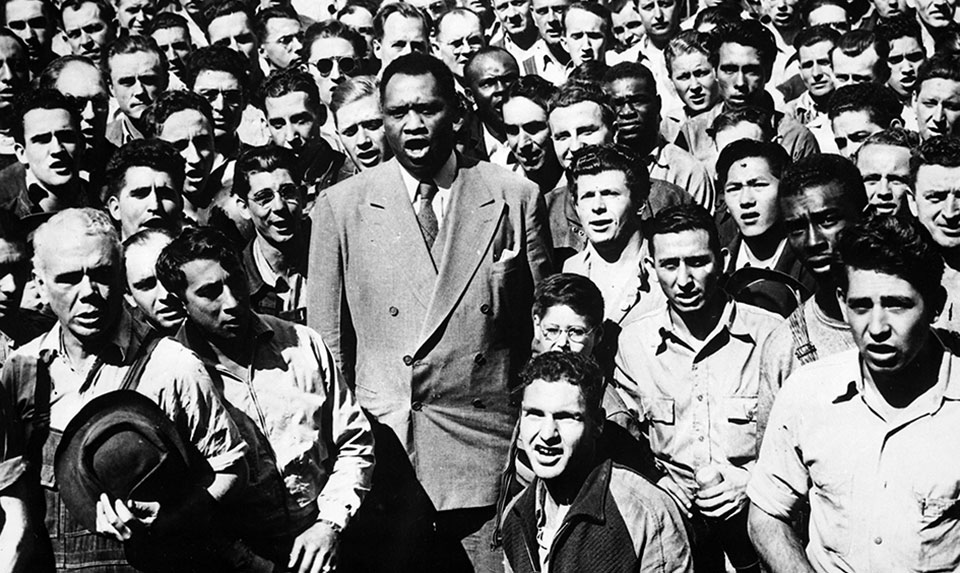
We are reposting this article from 2013 in observance of the anniversary of Paul Robeson’s death.
On January 23, 1976, noted singer and actor Paul Robeson died in Philadelphia.
Robeson was also a legendary civil rights and peace leader and athlete.
He was hounded by McCarthy-era witch-hunting committees, deprived of his livelihood and his right to travel for his actions and his beliefs.
Ironically, soon after the turn of the century, Robeson’s fame was carried throughout the nation by a beautiful 37-cent postage stamp bearing his portrait and calling him “an incomparable artist and singer, human rights advocate, scholar and athlete, defender of Black freedom.”
Many events were held in 1998 on the 100th anniversary of his birth. Calling Robeson “a great fighter for equality and world peace, a genius who gave his heart and soul to the people,” Jarvis Tyner, executive vice-chair of the Communist Party USA, said he “embraced all the advanced ideas of the CPUSA, the need for a socialist transformation of society, for unity of Black, Brown, and white. If you look at his writings and you know the party’s history and policies,” Tyner added, “he was an important figure, helping to give leadership in the party’s formulation of its policies.”
Paul Robeson, athlete, scholar, singer, actor and civil rights advocate, rose to fame at a time when segregation was legal in the U.S., and Black people were being lynched by racist mobs.
Robeson’s father, a runaway slave, graduated from Lincoln University, and his mother came from an abolitionist Quaker family.
Robeson attended Rutgers University on a four-year academic scholarship. He won 15 varsity letters and was twice named to the All-American football team. He became Phi Beta Kappa in his junior year and graduated as valedictorian.
At Columbia Law School, Robeson met and married Eslanda Cardoza Goode, who would become the first Black woman to head a pathology laboratory. He took a job in a law firm but left when a white secretary refused to take dictation from him. He then shifted to an acting and singing career.
Because Robeson was an outspoken activist, striking workers and peace and friendship with the Soviet Union, he was targeted by the McCarthy era witch-hunting House Un-American Activities Committee. Robeson refused to yield to the committee, which he considered to oppose freedom of expression of those working for international friendship and peace. He is famously quoted: “The artist must elect to fight for Freedom or for Slavery. I have made my choice. I had no alternative.”
Sixty of his concerts were canceled, and in 1949 two interracial outdoor concerts in Peekskill, N.Y., were attacked by racist mobs. “I’m going to sing wherever the people want me to sing,” Robeson responded, “and I won’t be frightened by crosses burning in Peekskill or anywhere else.”
In 1950 the government revoked Robeson’s passport, leading to an eight-year battle to win it back and to travel again.
Beginning in 1952, the Mine, Mill and Smelter Workers Union sponsored four annual Robeson concerts at Peace Arch Park on the U.S.-Canadian border, with as many as 40,000 in attendance.
A collection of Paul Robeson’s films, Paul Robeson: Portraits of the Artist, is available from Criterion Films.
The book from International Publishers: PAUL ROBESON, The Great Forerunner, was compiled by the editors of Freedomways magazine. Freedomways was the leading African-American theoretical, political and cultural journal of the 1960s-1980s. The Great Forerunner contains tributes to Robeson in prose and poetry by his contemporaries, selections from Robeson’s own writings, and a foreword by Ernest Kaiser, a prominent reviewer for Freedomways and a considerable bibliophile of Black works.

MOST POPULAR TODAY


Communist Karol Cariola elected president of Chile’s legislature

Zionist organizations leading campaign to stop ceasefire resolutions in D.C. area

Afghanistan’s socialist years: The promising future killed off by U.S. imperialism

High Court essentially bans demonstrations, freedom of assembly in Deep South






Comments